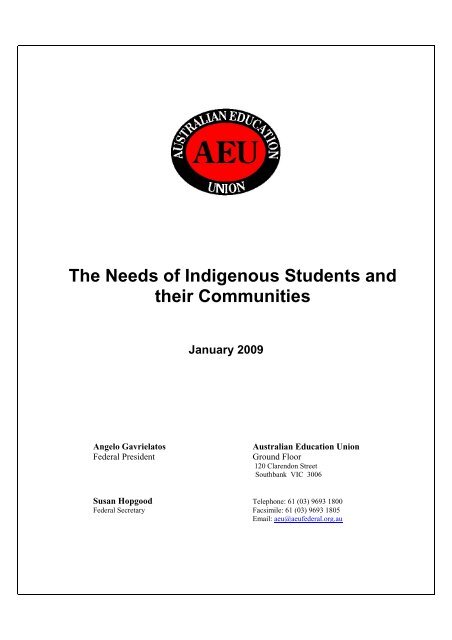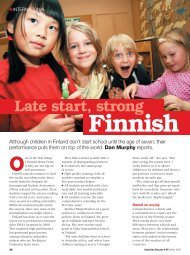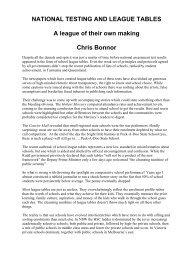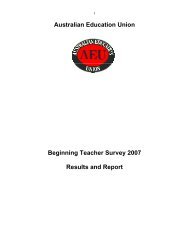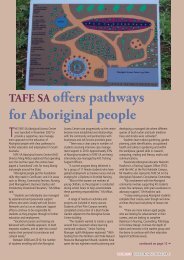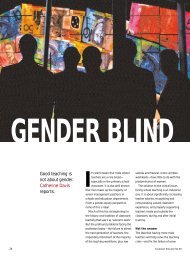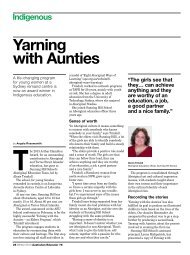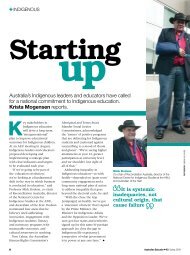The Needs of Indigenous Students and their Communities
The Needs of Indigenous Students and their Communities
The Needs of Indigenous Students and their Communities
Create successful ePaper yourself
Turn your PDF publications into a flip-book with our unique Google optimized e-Paper software.
<strong>The</strong> <strong>Needs</strong> <strong>of</strong> <strong>Indigenous</strong> <strong>Students</strong> <strong>and</strong><br />
<strong>their</strong> <strong>Communities</strong><br />
January 2009<br />
Angelo Gavrielatos<br />
Federal President<br />
Australian Education Union<br />
Ground Floor<br />
120 Clarendon Street<br />
Southbank VIC 3006<br />
Susan Hopgood Telephone: 61 (03) 9693 1800<br />
Federal Secretary Facsimile: 61 (03) 9693 1805<br />
Email: aeu@aeufederal.org.au
<strong>The</strong> Australian Education Union can take great pride in its history <strong>and</strong> traditions in<br />
championing the cause <strong>of</strong> <strong>Indigenous</strong> students <strong>and</strong> <strong>their</strong> communities.<br />
It is quite clear that the state <strong>of</strong> <strong>Indigenous</strong> education <strong>and</strong> the needs <strong>of</strong> <strong>Indigenous</strong><br />
students still require urgent attention. Fundamental issues <strong>of</strong> access <strong>and</strong> equity have yet<br />
to be addressed in many communities.<br />
By any measure, we have a long way to go in order to achieve an equality <strong>of</strong> learning<br />
outcomes for <strong>Indigenous</strong> students. <strong>The</strong> plight <strong>of</strong> our <strong>Indigenous</strong> students <strong>and</strong> <strong>their</strong><br />
communities remains the most pressing human rights issue which confronts us <strong>and</strong> must<br />
be confronted by us.<br />
In accepting our responsibility to deal with the fundamental injustices still apparent<br />
among <strong>Indigenous</strong> students <strong>and</strong> <strong>their</strong> communities we must continue our campaigns<br />
aimed at achieving an increase in government effort, resources <strong>and</strong> the promotion <strong>of</strong><br />
educational opportunities. While there are successful programs being implemented in<br />
some places, it must be acknowledged that these successes are usually isolated, short<br />
lived <strong>and</strong> do not have a wider positive impact on the overall system.<br />
<strong>The</strong> following areas are recognized as key areas for action to improve the outcomes for<br />
<strong>Indigenous</strong> students <strong>and</strong> <strong>their</strong> communities.<br />
Different Educational Structures <strong>and</strong> Models for the provision <strong>of</strong> public<br />
education to Aboriginal <strong>and</strong> Torres Strait Isl<strong>and</strong>er students<br />
<strong>The</strong> AEU continues to acknowledge that the provision <strong>of</strong> education to <strong>Indigenous</strong><br />
students cannot be “more <strong>of</strong> the same”.<br />
Accordingly, the AEU reiterates the need to consider <strong>and</strong> develop different structures<br />
<strong>and</strong> models that take into account the needs <strong>of</strong> <strong>Indigenous</strong> students <strong>and</strong> <strong>their</strong> particular<br />
communities. Different communities may need different models. An isolated country<br />
community may require a different configuration <strong>of</strong> structures <strong>and</strong> approaches than a<br />
school in an urban environment.<br />
Of course, the development <strong>of</strong> any such initiatives would require the prior consultation<br />
with <strong>and</strong> the agreement <strong>of</strong> local communities. <strong>The</strong> success <strong>of</strong> any such approach is<br />
reliant upon a shared sense <strong>of</strong> ownership.<br />
<strong>The</strong> alternative structures / models may include the following characteristics.<br />
• <strong>The</strong> establishment <strong>of</strong> programs operating from schools, involving appropriate<br />
government agencies, to support parents <strong>and</strong> <strong>their</strong> children aged 0 - 4. This<br />
would establish important links between school <strong>and</strong> community from an early<br />
stage.<br />
• <strong>The</strong> establishment <strong>of</strong> education complexes delivering pre-school, school <strong>and</strong><br />
post compulsory education (TAFE).<br />
• <strong>The</strong> establishment <strong>of</strong> genuine inter-agency programs operating from schools with<br />
significant <strong>Indigenous</strong> populations, ensuring the school is the centre <strong>of</strong><br />
community. <strong>The</strong>se programs should be run by departments <strong>of</strong> Health, Sport <strong>and</strong><br />
Report on <strong>Needs</strong> <strong>of</strong> <strong>Indigenous</strong> <strong>Students</strong> <strong>and</strong> <strong>their</strong> <strong>Communities</strong>- January 2009 1
Recreation <strong>and</strong> other relevant government departments complementing the work<br />
<strong>of</strong> education departments.<br />
• Without compromising the entitlements <strong>of</strong> employees, the establishment <strong>of</strong><br />
extended operational hours <strong>and</strong> days - up to forty eight (48) weeks per year.<br />
Staffing Policies.<br />
With respect to the issue <strong>of</strong> teacher supply <strong>and</strong> retention in difficult-to-staff schools,<br />
whilst acknowledging the contribution <strong>and</strong> positive influence <strong>of</strong> beginning teachers, it is<br />
also acknowledged that teacher experience, continuity <strong>and</strong> stability contribute<br />
significantly to improved student outcomes <strong>and</strong> school development initiatives.<br />
Whilst there is much to be learnt from successful programs the AEU supports the further<br />
development <strong>and</strong> negotiation <strong>of</strong> new staffing policies aimed at increasing the number <strong>of</strong><br />
experienced teachers in identified difficult-to-staff schools, increasing leadership density<br />
<strong>and</strong> correspondingly reducing the number <strong>of</strong> beginning teacher appointments.<br />
Furthermore, new staffing policy should include initiatives that include the early<br />
appointment <strong>and</strong> in-servicing <strong>of</strong> new teachers including principals who will teach in<br />
schools with significant <strong>Indigenous</strong> enrolments. <strong>The</strong> appointment <strong>of</strong> new teachers<br />
including principals during the final term <strong>of</strong> the school year, prior to the new school year,<br />
will ensure continuity <strong>of</strong> programs for students.<br />
Improvements in the recruitment <strong>and</strong> retention incentives available to classroom<br />
teachers, executive teachers <strong>and</strong> principals serving in geographically isolated, difficultto-staff<br />
schools in <strong>Indigenous</strong> communities are also required.<br />
Staffing policies must also promote the development <strong>and</strong> support <strong>of</strong> local <strong>Indigenous</strong><br />
teachers <strong>and</strong> support staff. Apart from serving as positive role models for students which<br />
will assist in improving cultural underst<strong>and</strong>ing <strong>and</strong> the learning outcomes for students,<br />
such endeavours will serve to increase the capacity <strong>of</strong> community as a whole.<br />
New industrial instruments / agreements<br />
<strong>The</strong> AEU, together with its Branches <strong>and</strong> Associated Bodies in each state <strong>and</strong> territory,<br />
indicates its preparedness to negotiate changes aimed at improving the educational well<br />
being <strong>of</strong> <strong>Indigenous</strong> students. Variations to existing arrangements need to be negotiated<br />
<strong>and</strong> reflected in new/varied Awards/EBAs/Agreements as appropriate.<br />
Report on <strong>Needs</strong> <strong>of</strong> <strong>Indigenous</strong> <strong>Students</strong> <strong>and</strong> <strong>their</strong> <strong>Communities</strong>- January 2009 2


